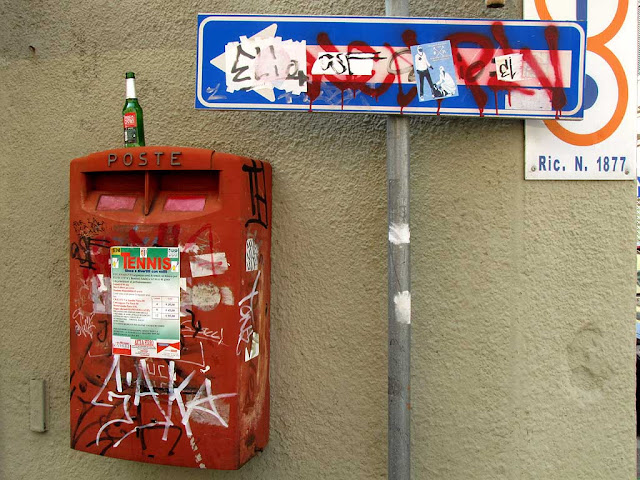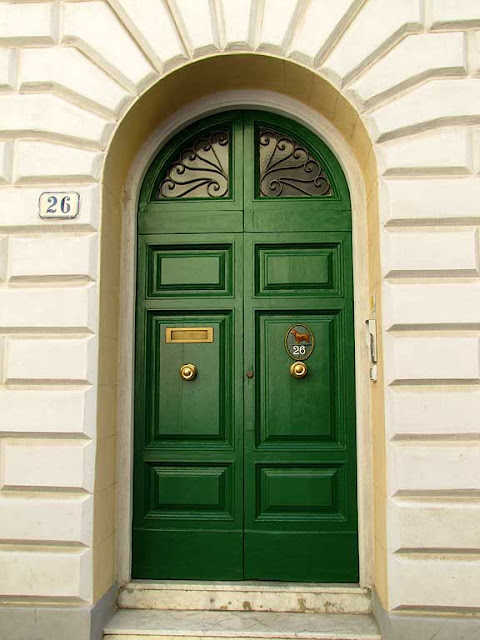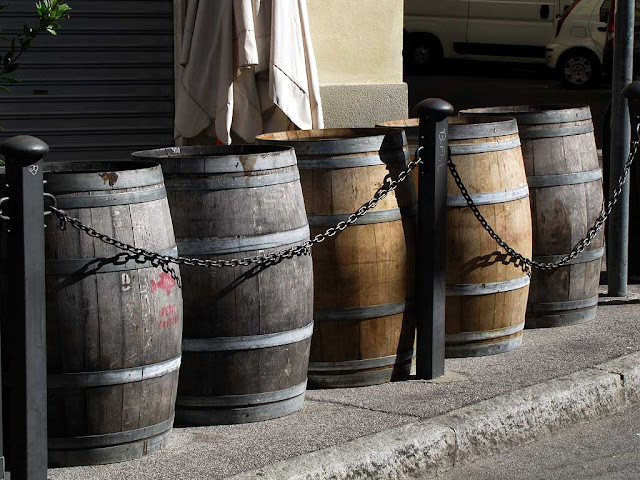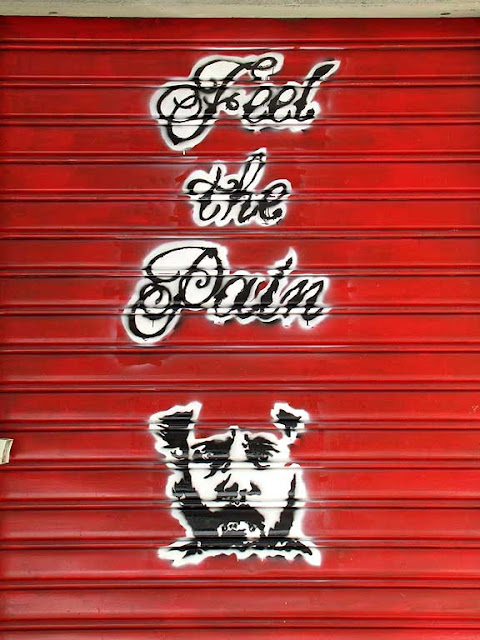 Bottles with the wax of many candles.
Bottles with the wax of many candles.Saturday, October 8, 2011
Friday, October 7, 2011
Hopeless
 I usually spare you this kind of photos from my walks.
I usually spare you this kind of photos from my walks. Sometimes I think this city is hopeless, some people seem to revel in defacing everything and in throwing garbage around.
Sometimes I think this city is hopeless, some people seem to revel in defacing everything and in throwing garbage around. If you ask, it is always someone else's fault, but this misbehavior is widespread, tolerated and growing.
If you ask, it is always someone else's fault, but this misbehavior is widespread, tolerated and growing.
Labels:
Livorno
Thursday, October 6, 2011
Wednesday, October 5, 2011
More Animals
 Keeping an eye on the window od the Coin department store.
Keeping an eye on the window od the Coin department store. Testimonials of a furniture store in “Corso Amedeo”.
Testimonials of a furniture store in “Corso Amedeo”. Ready to jump from a shop window in “Via Magenta”.
Ready to jump from a shop window in “Via Magenta”.See also: Animali
Labels:
Livorno
Tuesday, October 4, 2011
Feel the Pain
 A bike on the stairs leading down from “Piazza della Repubblica” to the water level of the “Fosso Reale”.
A bike on the stairs leading down from “Piazza della Repubblica” to the water level of the “Fosso Reale”. One more elegant front door, this one in “Via Giovannetti”.
One more elegant front door, this one in “Via Giovannetti”. A row of barrel-tables outside a pizzaria in “Via Del Fante”.
A row of barrel-tables outside a pizzaria in “Via Del Fante”. The self-defeating ad on a tattoo parlor shutter in “Via Paoli”.
The self-defeating ad on a tattoo parlor shutter in “Via Paoli”. Something unusual at the entrance of a condo in “Via Giusti”.
Something unusual at the entrance of a condo in “Via Giusti”.More Walks
Monday, October 3, 2011
Tug of War
 I am not sure when the “Cassa di Risparmi” gym in “Via Bosi” was built, but it was probably when tug of war was still an Olympic sport (1900-1920).
I am not sure when the “Cassa di Risparmi” gym in “Via Bosi” was built, but it was probably when tug of war was still an Olympic sport (1900-1920). The facility, almost adjacent to the church of “San Benedetto”, was mainly used by local schools without a gym, but surely not for Greco-Roman wrestling...
The facility, almost adjacent to the church of “San Benedetto”, was mainly used by local schools without a gym, but surely not for Greco-Roman wrestling... ...or archery.
...or archery.
Labels:
bas-relief,
building,
gym,
Livorno
Sunday, October 2, 2011
A Dying Man
Montgomery Carmichael was a British consular official and then consul in Livorno from 1890 to 1922. After retiring, he lived in Livorno until his death in 1936. He published his Tuscan Towns, Tuscan Types and the Tuscan Tongue in 1901. This is the last of three posts, from a chapter of the book, with the unlucky end of this story.
 Poor “Cialì”! He managed to wind himself very closely about my heart-strings. Most keenly did I realise this one terrible night last December. I saw — a familiar enough sight — a company of the masked Misericordia Brothers running full tilt down the main street with their easy-springed hand ambulance cart, foot-passengers and traffic willingly making an avenue for them, as when a fire-engine tears along the London streets. The light of a fitful gas-lamp revealed the form of a prostrate human being in the cart, and then lit up with momentary horror the ghastly features of poor “Cialì” contorted with the anguish of mortal pain. I saw, with a pang at my heart, a sign which showed me it was a very serious case. These Misericordia Brothers, for all they are a religious confraternity, are a very practical set of people. One of the Brothers was running alongside, holding the dying man's wrist, and keeping his fingers upon the flickering pulse; in his left hand he held a large stop-watch, so that if the sufferer died upon the road the police could be informed of the exact moment of death. I followed swiftly towards the hospital ; but before many moments were over the pace of the runners slackened, for the poor pulse had ceased to beat for ever.
Poor “Cialì”! He managed to wind himself very closely about my heart-strings. Most keenly did I realise this one terrible night last December. I saw — a familiar enough sight — a company of the masked Misericordia Brothers running full tilt down the main street with their easy-springed hand ambulance cart, foot-passengers and traffic willingly making an avenue for them, as when a fire-engine tears along the London streets. The light of a fitful gas-lamp revealed the form of a prostrate human being in the cart, and then lit up with momentary horror the ghastly features of poor “Cialì” contorted with the anguish of mortal pain. I saw, with a pang at my heart, a sign which showed me it was a very serious case. These Misericordia Brothers, for all they are a religious confraternity, are a very practical set of people. One of the Brothers was running alongside, holding the dying man's wrist, and keeping his fingers upon the flickering pulse; in his left hand he held a large stop-watch, so that if the sufferer died upon the road the police could be informed of the exact moment of death. I followed swiftly towards the hospital ; but before many moments were over the pace of the runners slackened, for the poor pulse had ceased to beat for ever.
It seems that two pot-valiant Welsh firemen had got into an altercation with a sober Tuscan seaman. A real or fancied insult to the girl on the man's arm was the cause of it The blood which gets into a Tuscan's head upon the venom motions of mad jealousy is more deadly than any drink: out came the inevitable knife. But “Cialì,” the peacemaker, was near at hand. He rushed up — too late alas ! — to quench the flames, for the insensate Tuscan no longer knew what he did, and poor “Cialì” received, just above the heart, the terrible blade that was meant for a far unworthier breast. And so he died, a martyr to his love of Great Britain, and in heroic devotion to her offscourings.
“Cialì’s” funeral was a great affair. All the waterside population turned out. Many British seamen were present; most of them took a turn at carrying the coffin the five long miles to the Campo Santo. Best of all, an English captain who had known him for years, and like everybody else used him as “unpaid factotum,” brought a Red Ensign, and covered the coffin with it. Borne to his grave by British seamen and covered with the Union Jack! The tingling sensations of an honest, simple pride must surely have caused him to turn in his coffin. If the poor fellow could but have known of the honours that awaited him in death, how exultantly he would have marched into the undiscovered country from whose bourne no traveller returns. May his soul rest in peace!
First of three parts - Second of three parts - Third of three parts
Montgomery Carmichael, “In Tuscany”
John Murray, London 1901
See also: In Tuscany - Leghorn “la Cara”
“In Tuscany” by Montgomery Carmichael is available here.
 Poor “Cialì”! He managed to wind himself very closely about my heart-strings. Most keenly did I realise this one terrible night last December. I saw — a familiar enough sight — a company of the masked Misericordia Brothers running full tilt down the main street with their easy-springed hand ambulance cart, foot-passengers and traffic willingly making an avenue for them, as when a fire-engine tears along the London streets. The light of a fitful gas-lamp revealed the form of a prostrate human being in the cart, and then lit up with momentary horror the ghastly features of poor “Cialì” contorted with the anguish of mortal pain. I saw, with a pang at my heart, a sign which showed me it was a very serious case. These Misericordia Brothers, for all they are a religious confraternity, are a very practical set of people. One of the Brothers was running alongside, holding the dying man's wrist, and keeping his fingers upon the flickering pulse; in his left hand he held a large stop-watch, so that if the sufferer died upon the road the police could be informed of the exact moment of death. I followed swiftly towards the hospital ; but before many moments were over the pace of the runners slackened, for the poor pulse had ceased to beat for ever.
Poor “Cialì”! He managed to wind himself very closely about my heart-strings. Most keenly did I realise this one terrible night last December. I saw — a familiar enough sight — a company of the masked Misericordia Brothers running full tilt down the main street with their easy-springed hand ambulance cart, foot-passengers and traffic willingly making an avenue for them, as when a fire-engine tears along the London streets. The light of a fitful gas-lamp revealed the form of a prostrate human being in the cart, and then lit up with momentary horror the ghastly features of poor “Cialì” contorted with the anguish of mortal pain. I saw, with a pang at my heart, a sign which showed me it was a very serious case. These Misericordia Brothers, for all they are a religious confraternity, are a very practical set of people. One of the Brothers was running alongside, holding the dying man's wrist, and keeping his fingers upon the flickering pulse; in his left hand he held a large stop-watch, so that if the sufferer died upon the road the police could be informed of the exact moment of death. I followed swiftly towards the hospital ; but before many moments were over the pace of the runners slackened, for the poor pulse had ceased to beat for ever.It seems that two pot-valiant Welsh firemen had got into an altercation with a sober Tuscan seaman. A real or fancied insult to the girl on the man's arm was the cause of it The blood which gets into a Tuscan's head upon the venom motions of mad jealousy is more deadly than any drink: out came the inevitable knife. But “Cialì,” the peacemaker, was near at hand. He rushed up — too late alas ! — to quench the flames, for the insensate Tuscan no longer knew what he did, and poor “Cialì” received, just above the heart, the terrible blade that was meant for a far unworthier breast. And so he died, a martyr to his love of Great Britain, and in heroic devotion to her offscourings.
“Cialì’s” funeral was a great affair. All the waterside population turned out. Many British seamen were present; most of them took a turn at carrying the coffin the five long miles to the Campo Santo. Best of all, an English captain who had known him for years, and like everybody else used him as “unpaid factotum,” brought a Red Ensign, and covered the coffin with it. Borne to his grave by British seamen and covered with the Union Jack! The tingling sensations of an honest, simple pride must surely have caused him to turn in his coffin. If the poor fellow could but have known of the honours that awaited him in death, how exultantly he would have marched into the undiscovered country from whose bourne no traveller returns. May his soul rest in peace!
First of three parts - Second of three parts - Third of three parts
Montgomery Carmichael, “In Tuscany”
John Murray, London 1901
See also: In Tuscany - Leghorn “la Cara”
“In Tuscany” by Montgomery Carmichael is available here.
Labels:
Livorno
Subscribe to:
Posts (Atom)

